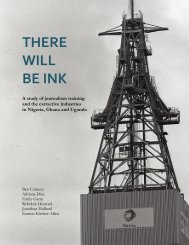Paper - Initiative for Policy Dialogue
Paper - Initiative for Policy Dialogue
Paper - Initiative for Policy Dialogue
Create successful ePaper yourself
Turn your PDF publications into a flip-book with our unique Google optimized e-Paper software.
32<br />
on governance. It is the focus of the contributions of Mushtaq Khan, Thandika<br />
Mkandewire and Meles Zenawi. The nexus of governance and the state also feature<br />
significantly in the contributions of Fosu, Hanatani and Watanabe, Ohno and Ohno,<br />
Oyeyinka and Sampath, and of Sen and te Velde.)<br />
While the “governance” discussion is important—it is clearly one of the critical issues<br />
facing the countries of the sub-continent (and, in one <strong>for</strong>m or another, virtually all<br />
countries around the world) -- we argue that the “good governance” agenda as it has<br />
come to be defined and pursued in Africa has itself become a part of the problem. We<br />
propose a radically different approach-- what Mushtaq Khan’s paper refers to as “growthenhancing”<br />
governance and which is closely allied with the call <strong>for</strong> a focus on<br />
“trans<strong>for</strong>mative” rather than “restraining’ institutions in Thandika Mkandawire’s<br />
contribution We consider this to be necessary <strong>for</strong> Africa to achieve, sustained, rapid,<br />
poverty-reducing growth.<br />
Corruption and lack of competence of state institutions is widely believed to<br />
account <strong>for</strong> poor economic per<strong>for</strong>mance and in a vicious circle to prevent African<br />
governments from intervening effectively in the ways in which East Asian and other<br />
successful countries did. The “good governance” package confuses ends with means and<br />
in as much as it is about means to development, it can be misleading and diversionary.<br />
There is no gainsaying that appropriately designed anti-corruption ef<strong>for</strong>ts, democracy, the<br />
rule of law, clear and credible property rights and related elements of “good governance”<br />
are desirable in themselves. But such words often hide as much as they enlighten. As<br />
legal scholars have pointed out, there is more to the issue of property rights than the<br />
simplistic <strong>for</strong>mula “defining clear and credible property rights” might suggest. 55 Often<br />
these “prescriptions” have been used to promote a particular view of what institutions are<br />
the most important <strong>for</strong> development and how they should be designed; a view that is<br />
embedded in neo-liberalism and its excessive faith in markets. 56<br />
The first of the two contributions by Mushtaq Khan traces the roots of the “good<br />
governance” agenda and relates it to the wider literature on institutions and development.<br />
He finds a conflict between the conventional “good governance” agenda, which he calls<br />
“market-enhancing governance” and what should be the agenda from a developmental<br />
perspective: what he refers to as “growth-enhancing governance”. He attributes the<br />
<strong>for</strong>mer as emanating from a particular methodology and view of history – a view, which<br />
is in fact profoundly ahistorical and which con<strong>for</strong>ms to the neo-liberal take on the relative<br />
55 The property rights agenda has been at the center of the work of Hernando DeSoto. For a critique of<br />
these views, see David Kennedy (2003) ‘Laws and Developments’, pp 17–26 in A. Perry and J. Hatchard (eds) Law<br />
and Development: Facing Complexity in the 21st Century. London: Cavendish. or Haldar and Stiglitz { ]<br />
56 This is not to deny the vital importance of institutions; indeed it may well be that “institutions rule” as<br />
Rodrik et al. famously remarked. As Mkandawire reminds us development economics from its inception<br />
in the early post-war years has emphasized the role of institutions. Dani Rodrik & Arvind Subramanian &<br />
Francesco Trebbi (2004),"Institutions Rule: The Primacy of Institutions Over Geography and Integration in<br />
Economic Development," Journal of Economic Growth, vol. 9(2), pages 131-165, 06.














